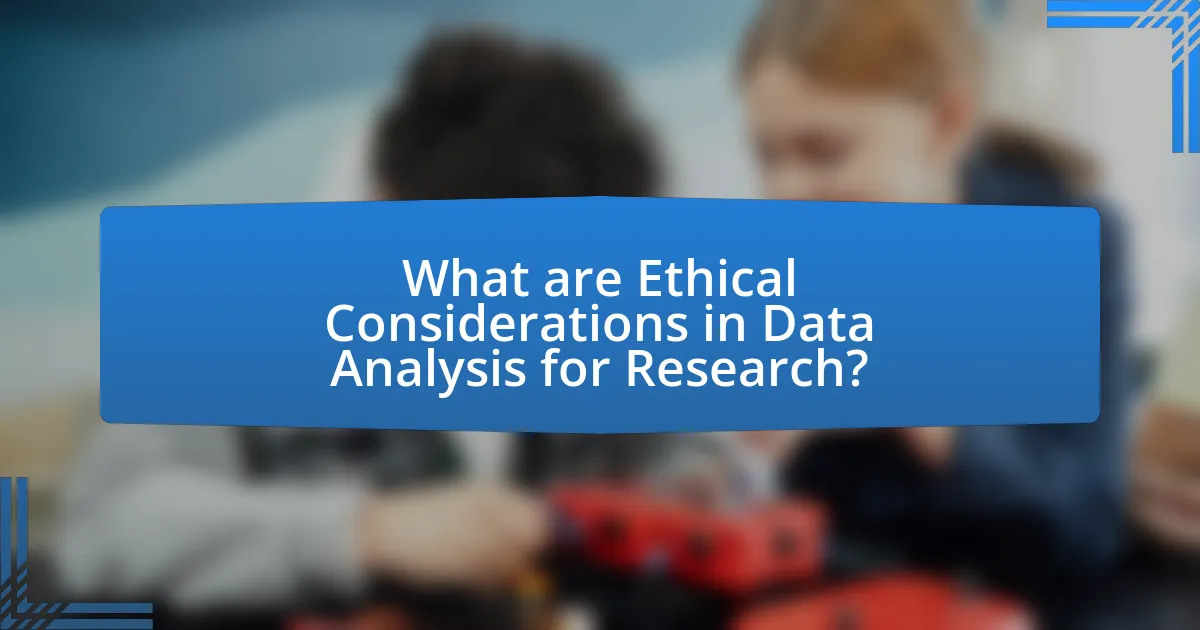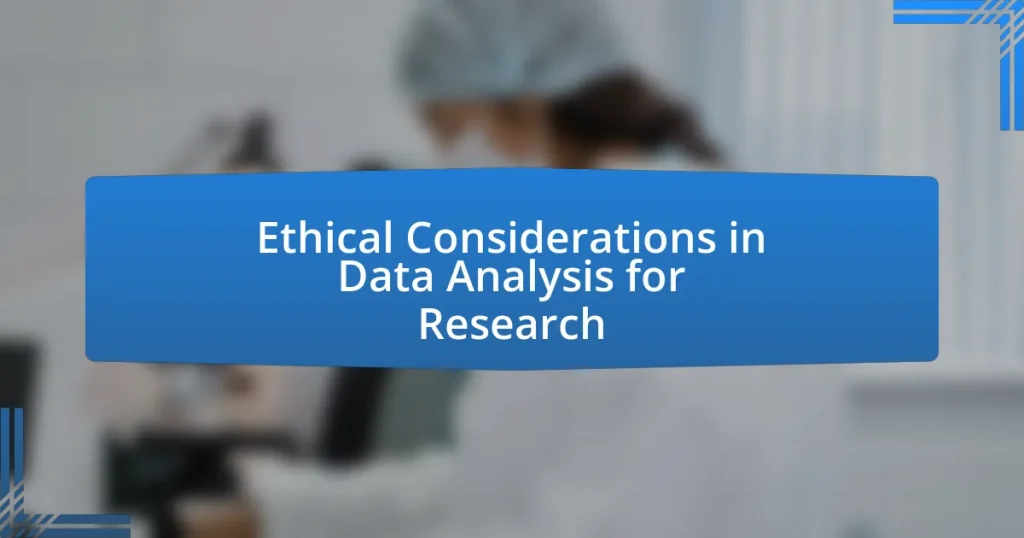Ethical considerations in data analysis for research encompass critical aspects such as informed consent, data privacy, and the avoidance of bias. Researchers are required to obtain informed consent from participants, ensuring transparency about the research’s purpose and data usage. Maintaining data privacy is essential for protecting sensitive information and complying with regulations like GDPR. Additionally, ethical principles such as respect for persons, beneficence, and justice guide researchers in their practices, impacting the integrity and validity of research outcomes. The article highlights key ethical issues, best practices, and the consequences of unethical data analysis, emphasizing the importance of ethical standards in fostering trust and credibility in research findings.

What are Ethical Considerations in Data Analysis for Research?
Ethical considerations in data analysis for research include ensuring informed consent, maintaining data privacy, and avoiding bias. Researchers must obtain informed consent from participants, which involves clearly communicating the purpose of the research and how their data will be used. Data privacy is crucial; researchers must implement measures to protect sensitive information and comply with regulations such as GDPR. Additionally, avoiding bias in data analysis is essential to ensure that findings are valid and representative. For instance, a study published in the Journal of Empirical Research on Human Research Ethics emphasizes the importance of ethical guidelines in safeguarding participant rights and enhancing the integrity of research outcomes.
Why are ethical considerations important in data analysis?
Ethical considerations are crucial in data analysis because they ensure the integrity, privacy, and fairness of the research process. By adhering to ethical standards, researchers protect the rights of individuals whose data is being analyzed, thereby fostering trust and credibility in the findings. For instance, the American Psychological Association emphasizes the importance of informed consent and confidentiality in research involving human subjects, which directly impacts the ethical handling of data. Furthermore, ethical data analysis prevents biases that could lead to misleading conclusions, as highlighted by studies showing that unethical practices can distort research outcomes and harm societal interests.
What ethical principles guide data analysis in research?
Ethical principles that guide data analysis in research include respect for persons, beneficence, and justice. Respect for persons emphasizes the importance of informed consent and the autonomy of participants, ensuring that individuals are fully aware of how their data will be used. Beneficence requires researchers to maximize benefits and minimize harm to participants, which involves careful consideration of the potential risks associated with data analysis. Justice focuses on fairness in the distribution of research benefits and burdens, ensuring that no group is unduly burdened or excluded from the advantages of research findings. These principles are foundational in maintaining integrity and trust in the research process, as outlined in the Belmont Report, which serves as a key document in ethical research practices.
How do ethical considerations impact research outcomes?
Ethical considerations significantly impact research outcomes by ensuring the integrity, validity, and societal acceptance of the research. When researchers adhere to ethical guidelines, such as obtaining informed consent and ensuring confidentiality, they enhance the credibility of their findings and foster trust among participants and the public. For instance, studies that fail to consider ethical implications, like the infamous Tuskegee Syphilis Study, resulted in long-lasting harm to communities and a profound distrust in medical research. This demonstrates that ethical lapses can lead to flawed data, biased results, and ultimately, detrimental societal consequences. Therefore, ethical considerations are essential for producing reliable and socially responsible research outcomes.
What are the key ethical issues in data analysis?
The key ethical issues in data analysis include privacy, consent, data integrity, and bias. Privacy concerns arise when personal data is collected and analyzed without adequate protection, potentially leading to unauthorized access or misuse. Consent is critical, as individuals must be informed and agree to how their data will be used, which is mandated by regulations like GDPR. Data integrity involves ensuring that the data is accurate and reliable, as flawed data can lead to misleading conclusions. Lastly, bias in data analysis can result from unrepresentative samples or flawed algorithms, which can perpetuate discrimination or inequality. These issues highlight the importance of ethical standards in data analysis to protect individuals and ensure the validity of research findings.
How does data privacy affect ethical data analysis?
Data privacy significantly impacts ethical data analysis by establishing the boundaries within which data can be collected, processed, and shared. Ethical data analysis requires adherence to privacy laws, such as the General Data Protection Regulation (GDPR), which mandates that personal data must be handled with consent and transparency. Violating these privacy standards can lead to legal repercussions and undermine public trust in research practices. For instance, a study published in the Journal of Medical Internet Research highlighted that breaches of data privacy can result in harmful consequences for individuals, including identity theft and discrimination. Thus, maintaining data privacy is essential for ensuring that ethical standards in data analysis are upheld, fostering responsible research practices.
What role does informed consent play in data collection?
Informed consent is crucial in data collection as it ensures that participants are fully aware of how their data will be used and agree to it voluntarily. This process protects individual autonomy and promotes ethical standards in research by requiring researchers to provide clear information about the purpose, risks, and benefits of the study. According to the Belmont Report, which outlines ethical principles and guidelines for research involving human subjects, informed consent is a fundamental requirement that upholds respect for persons, beneficence, and justice.
How can researchers ensure ethical data analysis practices?
Researchers can ensure ethical data analysis practices by adhering to established ethical guidelines and frameworks, such as obtaining informed consent, ensuring data privacy, and maintaining transparency in their methodologies. For instance, the American Psychological Association’s Ethical Principles of Psychologists emphasizes the importance of respecting participants’ rights and confidentiality. Additionally, researchers should implement data anonymization techniques to protect sensitive information and conduct regular ethical reviews to assess compliance with ethical standards. These practices not only safeguard participants but also enhance the credibility and integrity of the research findings.
What guidelines should researchers follow for ethical data handling?
Researchers should follow guidelines that prioritize participant consent, data confidentiality, and integrity in data handling. First, obtaining informed consent from participants is essential, ensuring they understand how their data will be used. Second, maintaining data confidentiality involves securely storing data and anonymizing it to protect participant identities. Third, researchers must ensure data integrity by accurately reporting findings and avoiding fabrication or manipulation of data. These guidelines are supported by ethical frameworks such as the Belmont Report, which emphasizes respect for persons, beneficence, and justice in research practices.
How can transparency enhance ethical data analysis?
Transparency enhances ethical data analysis by fostering trust and accountability among stakeholders. When researchers openly share their methodologies, data sources, and analytical processes, it allows for scrutiny and validation, which can prevent biases and unethical practices. For instance, a study published in the journal “Nature” highlighted that transparent reporting of data and methods significantly reduces the risk of misinterpretation and misuse of data, thereby promoting ethical standards in research. This openness not only protects the integrity of the research but also ensures that findings can be replicated and verified, which is a cornerstone of ethical scientific inquiry.
What are the consequences of unethical data analysis?
Unethical data analysis can lead to significant consequences, including misinformation, loss of credibility, and potential legal repercussions. Misinformation arises when data is manipulated or misrepresented, resulting in incorrect conclusions that can mislead stakeholders and the public. Loss of credibility occurs when organizations or researchers are found to engage in unethical practices, damaging their reputation and trustworthiness in the field. Legal repercussions may include lawsuits or regulatory penalties, particularly if the unethical analysis violates laws such as data protection regulations. For instance, the 2016 scandal involving the misuse of data by Cambridge Analytica highlighted how unethical practices can lead to widespread public outcry and legal scrutiny, emphasizing the importance of ethical standards in data analysis.
How can unethical practices damage research credibility?
Unethical practices can significantly damage research credibility by undermining the integrity of the findings and eroding public trust. When researchers engage in misconduct, such as data fabrication, falsification, or plagiarism, the validity of their results is compromised, leading to misinformation in the scientific community. For instance, a study published in the journal “Nature” in 2018 highlighted that retracted papers due to unethical practices can mislead subsequent research, resulting in wasted resources and potential harm to public health. This demonstrates that unethical behavior not only affects the individual study but can also have broader implications for the entire field, as it creates a ripple effect of distrust and skepticism towards legitimate research efforts.
What legal implications arise from unethical data analysis?
Unethical data analysis can lead to significant legal implications, including liability for fraud, breach of contract, and violations of data protection laws. Organizations that manipulate or misrepresent data may face lawsuits from affected parties, as seen in cases like the Theranos scandal, where misleading data led to criminal charges against executives. Additionally, unethical practices can result in penalties under regulations such as the General Data Protection Regulation (GDPR), which imposes strict guidelines on data handling and can lead to fines up to 4% of annual global revenue for non-compliance. These legal consequences underscore the importance of ethical standards in data analysis to avoid severe repercussions.
How do ethical considerations vary across different research fields?
Ethical considerations vary significantly across different research fields due to the nature of the subjects involved and the potential impact of the research outcomes. In medical research, for instance, ethical guidelines prioritize informed consent and the protection of vulnerable populations, as evidenced by the Declaration of Helsinki, which emphasizes the necessity of participant welfare. In contrast, social science research often focuses on confidentiality and the ethical treatment of data related to human behavior, as highlighted by the American Psychological Association’s ethical principles, which stress the importance of minimizing harm and ensuring privacy. Furthermore, in fields like environmental research, ethical considerations may include the impact of research on ecosystems and the rights of indigenous populations, as outlined in the United Nations Declaration on the Rights of Indigenous Peoples. Each field adapts its ethical framework to address specific risks and responsibilities associated with its research practices.
What unique ethical challenges exist in medical research data analysis?
Unique ethical challenges in medical research data analysis include issues of patient privacy, informed consent, and data integrity. Patient privacy is compromised when sensitive health information is not adequately protected, leading to potential misuse. Informed consent becomes complex when participants may not fully understand how their data will be used, especially in large datasets or secondary analyses. Data integrity is challenged by the potential for bias in data interpretation, which can affect research outcomes and public trust. These challenges necessitate stringent ethical guidelines and oversight to ensure responsible data handling and analysis in medical research.
How do social sciences approach ethical data analysis differently?
Social sciences approach ethical data analysis by prioritizing the context of human behavior and societal impact, which differs from other fields that may focus primarily on quantitative metrics. This discipline emphasizes informed consent, confidentiality, and the potential consequences of data use on individuals and communities. For instance, social scientists often engage with participants to ensure their understanding and agreement regarding data usage, reflecting a commitment to ethical standards that protect vulnerable populations. Additionally, social sciences frequently incorporate ethical review boards to assess research proposals, ensuring that ethical considerations are integrated into the research design from the outset. This approach is supported by guidelines from organizations such as the American Psychological Association, which outlines ethical principles for conducting research involving human subjects.
What best practices can researchers adopt for ethical data analysis?
Researchers can adopt several best practices for ethical data analysis, including obtaining informed consent, ensuring data privacy, and maintaining transparency in methodologies. Informed consent involves clearly communicating the purpose of data collection and how the data will be used, allowing participants to make an educated decision about their involvement. Ensuring data privacy requires implementing measures to protect sensitive information, such as anonymizing data and using secure storage solutions. Transparency in methodologies involves openly sharing the analytical processes and decisions made during the research, which fosters trust and allows for reproducibility. These practices align with ethical guidelines established by organizations such as the American Psychological Association, which emphasizes the importance of ethical standards in research to protect participants and uphold the integrity of the scientific process.
How can researchers implement ethical training for data analysis?
Researchers can implement ethical training for data analysis by developing structured programs that include guidelines on data privacy, informed consent, and responsible data usage. These programs should incorporate real-world case studies to illustrate ethical dilemmas and best practices, ensuring that researchers understand the implications of their work. Evidence from the “Ethics of Data Science” report by the Data Science Association highlights that training significantly improves ethical decision-making among researchers, leading to more responsible data handling and analysis.
What tools and resources are available to support ethical data practices?
Tools and resources available to support ethical data practices include data governance frameworks, ethical guidelines from organizations like the American Psychological Association, and software tools such as Data Ethics Canvas and Open Data Toolkit. Data governance frameworks provide structured approaches to managing data responsibly, ensuring compliance with legal and ethical standards. Ethical guidelines from professional organizations offer principles for conducting research ethically, emphasizing respect for participants and data integrity. Software tools like Data Ethics Canvas facilitate the identification and assessment of ethical issues in data projects, while Open Data Toolkit aids in the responsible sharing and management of data. These resources collectively enhance the ability to conduct ethical data practices in research.
What are common pitfalls in ethical data analysis and how to avoid them?
Common pitfalls in ethical data analysis include data misrepresentation, lack of informed consent, and inadequate data privacy measures. To avoid data misrepresentation, analysts should ensure accurate reporting of findings and avoid cherry-picking data that supports a specific narrative. Lack of informed consent can be mitigated by clearly communicating the purpose of data collection and obtaining explicit permission from participants. Inadequate data privacy measures can be addressed by implementing robust data protection protocols, such as anonymization and secure storage solutions. These practices are essential to uphold ethical standards and maintain trust in research outcomes.


